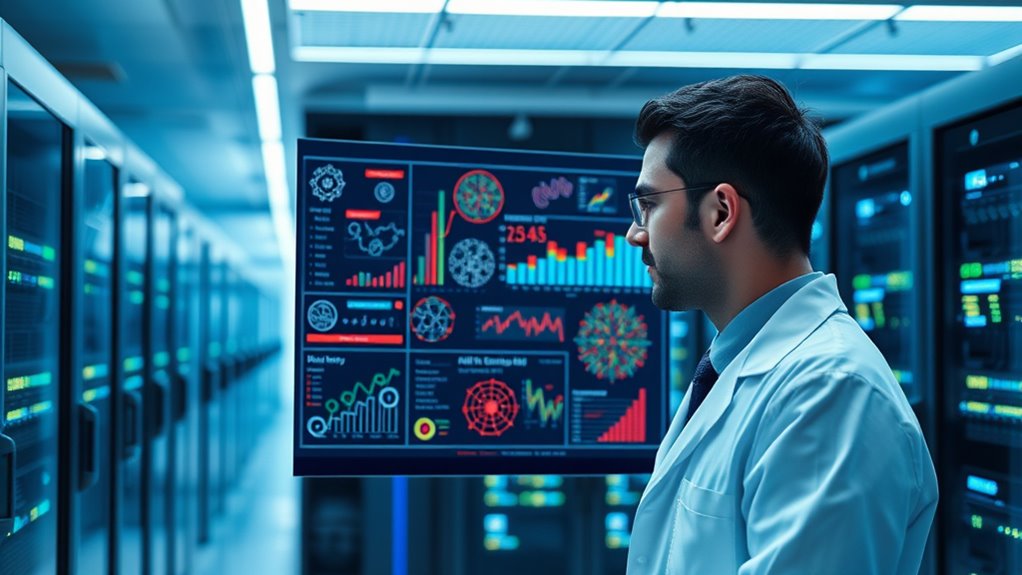AI now accurately predicts your risk for over a thousand health conditions years before symptoms show. It analyzes your health records, genetics, lifestyle, and data from wearables and smartphones to create personalized, dynamic risk profiles. These insights help you and your healthcare team take early, targeted actions to prevent diseases like diabetes or heart problems. If you want to find out how this technology could impact your health in the future, stay tuned for more details.
Key Takeaways
- AI models analyze diverse data sources to forecast individual risks for over 1,000 health conditions years in advance.
- They generate personalized, dynamic health profiles to identify early warning signs and enable proactive interventions.
- Combining electronic health records, wearables, and lifestyle data, AI provides comprehensive risk assessments.
- AI-driven predictions support early, targeted prevention strategies, reducing disease progression and healthcare costs.
- Real-time monitoring and alerts allow healthcare providers to adjust treatments promptly based on evolving risk factors.

Artificial intelligence is revolutionizing healthcare by predicting personal risks for over a thousand conditions, often years before symptoms appear. With models like Delphi-2M, you can now get an early glimpse into your health trajectory, enabling you to take preventive steps long before any signs emerge. This AI system analyzes your health records and lifestyle data to estimate your likelihood of developing diseases such as cancer, skin conditions, or immune disorders up to 20 years in advance. Unlike traditional single-disease predictors, Delphi-2M models multiple illnesses simultaneously, offering an all-encompassing view of your future health landscape. It produces detailed health trajectories, which are invaluable for designing early, targeted interventions to mitigate risks and improve outcomes. Trained on extensive data from hundreds of thousands of individuals, the model leverages this large dataset to improve the accuracy of its predictions. Using diverse data sources, AI tools integrate information from wearables, genetics, lifestyle surveys, and smartphone signals to create dynamic, individualized risk profiles. These profiles don’t just provide static risk scores; they project how your health may evolve over time, giving you and your healthcare providers a powerful tool for proactive management. For instance, if your blood pressure readings or activity levels change significantly, the system can generate real-time alerts indicating an increased risk of cardiovascular issues, prompting timely intervention. This personalized approach surpasses traditional metrics like BMI or general risk scores, offering insights tailored specifically to you. AI’s role extends beyond prediction. It detects early warning signs for chronic illnesses such as diabetes, heart disease, or hypertension by analyzing trends in your data. This allows healthcare providers to craft personalized preventive care plans based on large datasets, reducing the chances of hospitalization and lowering overall healthcare costs. Patients benefit from automated reports, digital alerts, and interactive health dashboards that boost engagement and foster proactive health management. When vitals or risk indicators change, AI can suggest adjustments to your care plan, helping prevent disease progression and complications. Turbocharger installations enhance the performance of various vehicles and similarly, risk scoring driven by AI enhances healthcare outcomes by improving how clinicians stratify patient risks and tailor treatments. Studies show that this approach can notably cut preventable deaths, like reducing sepsis mortality by 17% in some hospitals. It offers real-time data integration from electronic health records and medical devices, delivering actionable insights that support better decision-making. While challenges like data privacy, bias, and clinical workflow integration remain, the benefits are clear. Large-scale implementations, such as in Russia, have shown AI’s ability to analyze vast populations quickly, identify high-risk individuals early, and support disease prevention at a community level.
Frequently Asked Questions
How Accurate Are AI Risk Predictions Compared to Traditional Methods?
You’ll find that AI risk predictions are generally comparable to non-expert physicians, with about 52% accuracy, and they outperform traditional risk calculators in some clinical contexts. However, they still fall short of expert physicians, with roughly 16% lower accuracy. While AI models show promise across various specialties and conditions, their reliability depends on proper evaluation, bias control, and integration into clinical workflows.
Can AI Predict Risks for Rare or Newly Discovered Conditions?
You might be surprised, but AI can indeed predict risks for rare or newly discovered conditions. It achieves this by analyzing diverse data sources and using advanced models like natural language processing, which improve prediction accuracy by over 150-200% for unseen diseases. This technology helps identify early warning signs, even with limited data, enabling timely interventions and reducing diagnostic delays, ultimately improving patient outcomes.
What Privacy Measures Protect Personal Health Data Used by AI?
You are protected by strict privacy measures when AI uses your health data. Regulations like HIPAA, GDPR, and CCPA require clear consent, transparent disclosures, and limits on data collection. Organizations must implement strong security practices like encryption and access controls, only collect necessary data, and ensure third-party vendors follow the same standards. You can also access, correct, or delete your data, giving you control and safeguarding your personal health information.
How Can Patients Access and Understand Their Ai-Generated Risk Reports?
You access your AI-generated risk reports through secure patient portals, mobile apps, or direct messages. To understand them, look for clear visual aids, read explanations of influencing factors, and review recommended next steps. Don’t hesitate to ask your healthcare provider questions, seek simplified summaries if needed, and remember that these reports are tools to support, not replace, professional medical advice. Always prioritize your provider’s guidance for accurate interpretation.
Are There Limitations to Ai’s Ability to Predict Mental Health Conditions?
Yes, there are limitations to AI’s ability to predict mental health conditions. You should know that AI relies on the quality and diversity of training data, which can be biased or incomplete. It struggles to interpret subjective symptoms influenced by personal and environmental factors, leading to inaccuracies. Additionally, cultural differences and overlapping symptoms make precise diagnosis difficult. Remember, AI is a tool to assist, not replace, clinical judgment.
Conclusion
As you explore this groundbreaking AI, it’s almost as if the technology predicted your own health journey before you even knew it. Sometimes, coincidence reveals hidden truths, reminding you that awareness is the first step toward prevention. While AI offers powerful insights, it’s up to you to act on them. Just like a chance encounter that changes everything, this technology could be the subtle nudge you need to take control of your future health.







